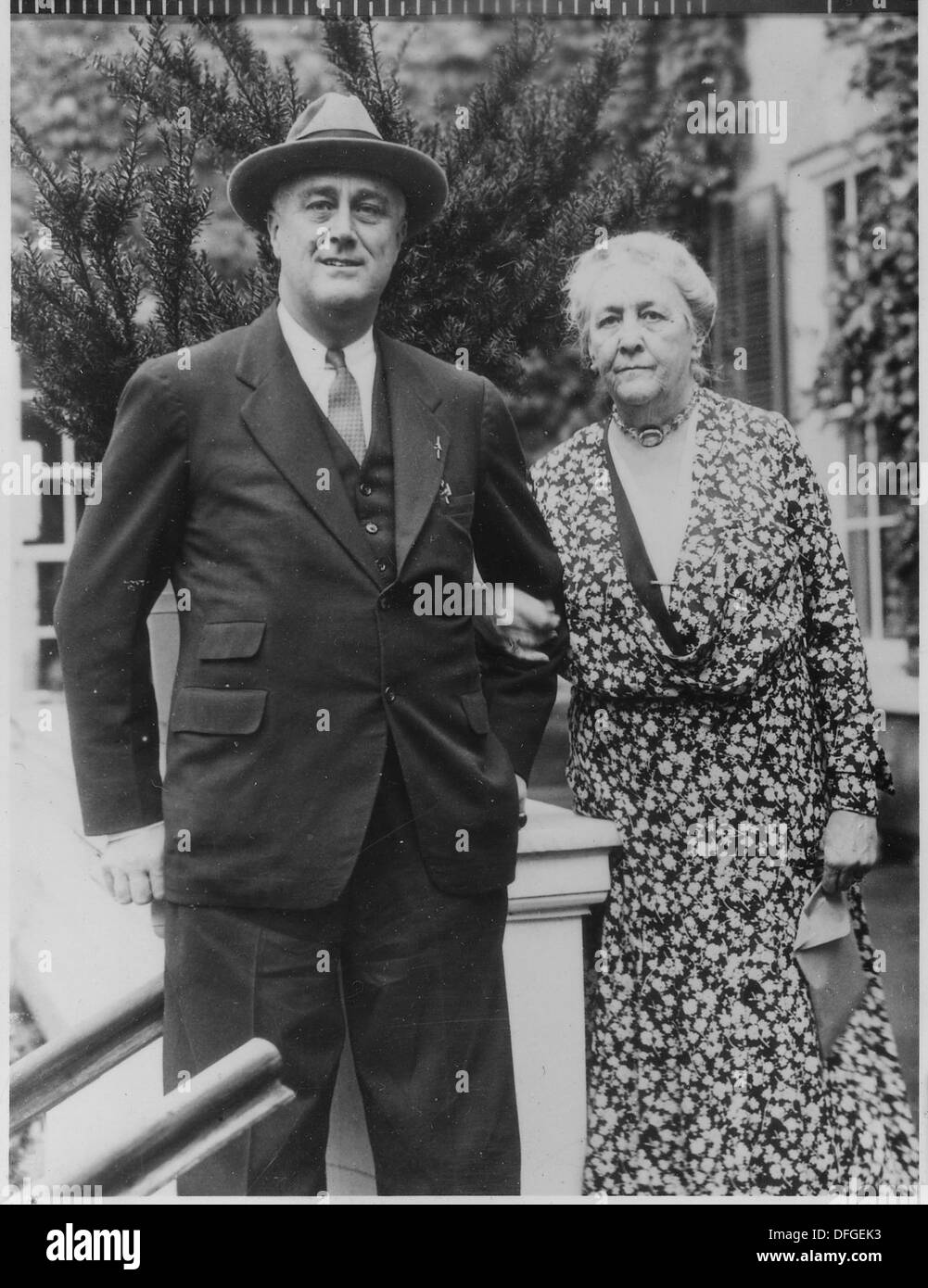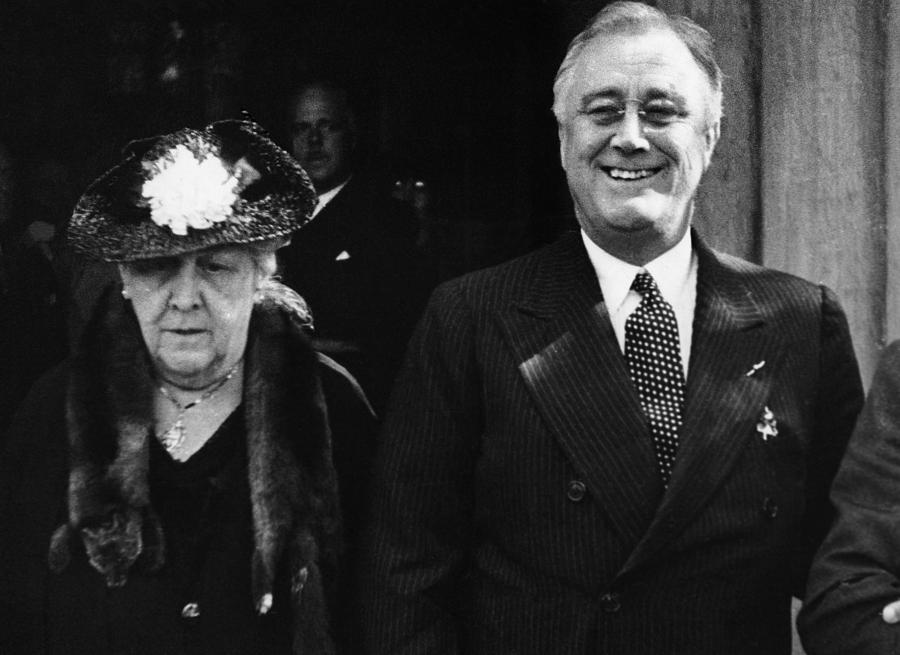Sara Delano Roosevelt: FDR's Mother, Her Life & Influence
Could the legacy of one of America's most transformative presidents be attributed, in part, to the unwavering influence of his mother? The story of Franklin Delano Roosevelt is intrinsically linked to Sara Delano Roosevelt, a woman whose presence shaped his life, career, and presidency in profound ways.
Franklin Delano Roosevelt, the 32nd President of the United States, served an unprecedented four terms, guiding the nation through the Great Depression and World War II. While history rightly acknowledges his political genius and leadership, it often overlooks the significant role played by the two prominent women in his life: his wife, Eleanor Roosevelt, a champion of social justice, and his mother, Sara Delano Roosevelt, a woman of immense wealth, unwavering devotion, and considerable influence. Sara's impact on FDR was undeniable, shaping his character, values, and even his political trajectory.
| Category | Information |
|---|---|
| Full Name | Sara Ann Delano Roosevelt (ne Delano) |
| Date of Birth | September 21, 1854 |
| Place of Birth | Delano Estate, Newburgh, New York |
| Date of Death | September 7, 1941 |
| Place of Death | Hyde Park, New York |
| Father | Warren Delano Jr. (Merchant, Senior Partner of Russell & Co., China Merchants) |
| Mother | Catherine Robbins (Lyman) Delano |
| Spouse | James Roosevelt I (Married in 1880) |
| Children | Franklin Delano Roosevelt (Only Child) |
| Residence | Hyde Park, New York; New York City |
| Occupation | Homemaker, Philanthropist |
| Legacy | Mother of President Franklin D. Roosevelt; Influential figure in FDR's life and career. |
| Reference | FDR Presidential Library and Museum |
Born on September 21, 1854, at the Delano estate in Newburgh, New York, Sara was the daughter of Warren Delano Jr. and Catherine Robbins Lyman. Warren Delano, a wealthy merchant, made and lost fortunes in the tea and opium trade in China, a background that instilled in Sara a keen understanding of wealth and privilege. She was the seventh of eleven children, growing up in a world of affluence and social standing. The Delano family, tracing its roots back to settlers who arrived in Plymouth, Massachusetts, in the 17th century, boasted a lineage of seafaring merchants, shipbuilders, and whalers, further cementing their position in American society.
Sara Delano was known for her striking beauty and charm, attracting numerous suitors. However, she found true happiness when she married James Roosevelt I in 1880, following a swift and passionate courtship. James, a wealthy widower, provided Sara with a life of comfort and security at his Hyde Park, New York, estate, Springwood. Their union produced one child, Franklin Delano Roosevelt, born in 1882. Due to a difficult birth, Franklin remained Saras only child, becoming the sole recipient of her unwavering attention and devotion.
Sara's influence on Franklin began in his earliest years. She was a doting mother, meticulously involved in every aspect of his upbringing. She dressed him in elaborate outfits, including miniature sailor suits and long dresses, reflecting the fashion of the time. She personally oversaw his education, hiring tutors and instilling in him a strong sense of moral values and social responsibility. Sara's close supervision extended beyond his academic pursuits; she cultivated his interests, encouraged his ambitions, and instilled in him a deep sense of self-confidence. This intense focus, while loving, also fostered a strong dependence on his mother's approval, a dynamic that would continue throughout his life.
The townhouse on the Upper East Side of New York City, designed by Charles A. Platt, stands as a testament to Sara's enduring influence. Commissioned in 1906 as a Christmas gift for Franklin and his future wife, Eleanor, the townhouse was a generous gesture that also served as a way for Sara to maintain a close connection with her son. Family lore has it that Sara presented them with a sketch of the townhouse on a piece of notepaper, complete with smoke curling from the chimney, symbolizing the warmth and comfort she wished to provide. The townhouse, completed in 1907, became a symbol of the Delano family's wealth and social standing in New York City.
- Dating Images Exploring Black Women What You Need To Know
- Lauren Hogg Parkland Survivor Activist Amp Her Impact Now
Sara's devotion to Franklin was unwavering, even when she disagreed with his choices. Her most notable disapproval came with his engagement to Eleanor Roosevelt, her distant cousin. Sara believed that Eleanor, though intelligent and well-meaning, was not the ideal partner for Franklin. She feared that Eleanor's independent spirit and strong social convictions would clash with Franklin's political ambitions. Despite her reservations, Sara ultimately accepted the marriage, but her complex relationship with Eleanor remained a constant undercurrent throughout their lives.
Despite her personal feelings about Eleanor, Sara remained a constant presence in Franklin's life and career. She provided him with unwavering emotional support, financial assistance, and political counsel. During the twelve years that FDR spent in the White House, from 1933 to 1945, he often sought refuge from the pressures of the Oval Office by reminiscing about the past with his mother. These moments of shared memories offered him comfort and a sense of grounding amidst the turmoil of national and international crises.
Sara's influence extended beyond the personal realm; she became a public figure in her own right. She played an active role in Franklin's campaigns, appearing at rallies and delivering speeches on his behalf. She even ghostwrote a campaign biography titled "My Boy, Franklin," further solidifying her image as the devoted mother of a future president. Her speeches on Mother's Day and the New Deal solidified a public persona that contrasted sharply with Eleanor Roosevelt's more activist stance. While Eleanor championed social reform and challenged the status quo, Sara presented herself as a traditional mother figure, providing comfort and stability during times of uncertainty.
One particularly noteworthy distinction is that Sara Delano Roosevelt holds the honor of being the first mother to cast a presidential vote for her son. This seemingly small detail underscores the profound impact she had on his life and career. It symbolizes her unwavering belief in his abilities and her active participation in his political journey.
FDR, recognizing his mother's appeal and influence, strategically utilized her presence. He often deployed her as a surrogate at home and even, on occasion, as an unofficial ambassador to European heads of state. Sara's charm, sophistication, and social connections proved invaluable in fostering goodwill and strengthening diplomatic ties.
Sara Delano Roosevelt died on September 7, 1941, at her home in Hyde Park, New York, just shy of her 87th birthday, following an acute circulatory collapse. By this point, she had become a well-known figure in her own right. Her death prompted an outpouring of grief and tributes from across the nation. Eleanor Roosevelt, in her syndicated column "My Day," acknowledged the countless messages of sympathy the White House received, underscoring the profound impact Sara had on the American public. At the time of her death, she was only the second mother, after Mary Washington, to witness her son's election to the presidency.
Sara (Delano) Roosevelt was, in essence, a New Yorker through and through. Born into a family of wealth and privilege, she embodied the grace and sophistication of her social class. Yet, beneath the veneer of affluence, she possessed a fierce devotion to her son, a keen understanding of power, and a willingness to use her influence to support his ambitions. Her legacy extends far beyond her role as Franklin Delano Roosevelt's mother; she was a woman who shaped a president and, in turn, helped shape the course of American history.
The story of Sara Delano Roosevelt offers a compelling glimpse into the life of a woman who wielded considerable influence behind the scenes. While Franklin Delano Roosevelt is rightly celebrated for his leadership and vision, it is essential to acknowledge the role played by his mother, Sara, in shaping the man he became. Her unwavering devotion, her social connections, and her strategic guidance all contributed to his remarkable success. As we reflect on the legacy of FDR, let us also remember the powerful influence of Sara Delano Roosevelt, a woman who truly left her mark on American history.
In 1934, Sara Delano Roosevelt commissioned Pierre Troubetzkoy, a renowned society painter, to create her portrait as a Mother's Day gift. This commission reveals her desire to present herself in a specific light, as a sophisticated and influential woman. Troubetzkoy, known for his portraits of celebrities, politicians, and even animals, captured Sara's elegance and poise, further solidifying her public image.
Sara's impact on FDR can be seen even in the architectural details of their lives. The townhouse commissioned as a Christmas gift exemplifies her desire to provide for her son and maintain a close family connection. The design of the townhouse, overseen by Sara, reflects her taste and preferences, serving as a physical manifestation of her influence.
The clash between Sara and Eleanor Roosevelt is a well-documented aspect of their relationship. Sara's traditional values and desire to control Franklin's life often clashed with Eleanor's progressive views and independent spirit. This dynamic created tension within the Roosevelt family and highlights the complex power dynamics between the two women.
Sara Delano Roosevelt's story is a testament to the power of maternal influence. Her unwavering devotion, financial resources, and social connections all played a significant role in shaping the life and career of Franklin Delano Roosevelt. While history rightly celebrates FDR's accomplishments, it is essential to acknowledge the contributions of the woman who stood by his side, guiding and supporting him every step of the way.
By Anne Adams, Franklin Delano Roosevelt stands as an important figure in twentieth-century American history, known for a multitude of achievements. As the only president elected to four terms, he was an innovative statesman who guided his country through an economic depression and a world war.
Warren Delano made his initial wealth in tea, silk, and opium, demonstrating the family's long-standing involvement in international trade and commerce.
- Dating Images Exploring Black Women What You Need To Know
- Exploring Emine Meydan More Facebook History And Search Fails

Sara Roosevelt Alchetron, The Free Social Encyclopedia

Franklin d roosevelt and sara delano roosevelt in hyde park Black and

Fdr Presidency. Sara Delano Roosevelt Photograph by Everett Fine Art